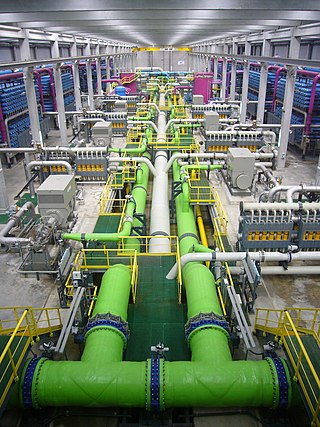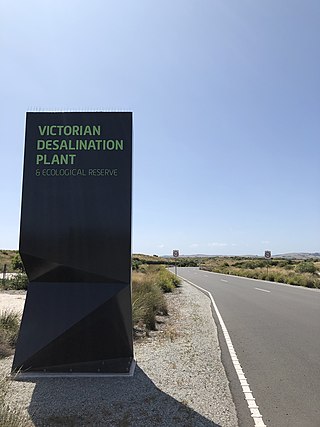
The economy of Israel is a highly developed free-market economy. The prosperity of Israel's advanced economy allows the country to have a sophisticated welfare state, a powerful modern military said to possess a nuclear-weapons capability with a full nuclear triad, modern infrastructure rivaling many Western countries, and a high-technology sector competitively on par with Silicon Valley. It has the second-largest number of startup companies in the world after the United States, and the third-largest number of NASDAQ-listed companies after the U.S. and China. American companies, such as Intel, Microsoft, and Apple, built their first overseas research and development facilities in Israel. More than 400 high-tech multi-national corporations, such as IBM, Google, Hewlett-Packard, Cisco Systems, Facebook and Motorola have opened R&D centers throughout the country.

Desalination is a process that takes away mineral components from saline water. More generally, desalination refers to the removal of salts and minerals from a target substance, as in soil desalination, which is an issue for agriculture. Saltwater is desalinated to produce water suitable for human consumption or irrigation. The by-product of the desalination process is brine. Desalination is used on many seagoing ships and submarines. Most of the modern interest in desalination is focused on cost-effective provision of fresh water for human use. Along with recycled wastewater, it is one of the few rainfall-independent water resources.
Science and technology in Israel is one of the country's most developed sectors. Israel spent 4.3% of its gross domestic product (GDP) on civil research and development in 2015, the highest ratio in the world. In 2019, Israel was ranked the world's fifth most innovative country by the Bloomberg Innovation Index. It ranks thirteenth in the world for scientific output as measured by the number of scientific publications per million citizens. In 2014, Israel's share of scientific articles published worldwide (0.9%) was nine times higher than its share of the global population (0.1%).

Netafim is an Israeli manufacturer of irrigation equipment. The company produces drippers, dripperlines, sprinklers and micro-emitters. Netafim also manufactures and distributes crop management technologies, including monitoring and control systems, dosing systems, and crop management software, as well as a variety of services, including managed irrigation, agronomical advisory and operation and maintenance. As of 2012, Netafim was the global leader on the fast expanding market of drip- and micro-irrigation. In it was the overall largest provider of drip irrigation systems, with a global market share of 30%.
The Thames Gateway Water Treatment Works or Beckton Desalination Plant is a desalination plant in Beckton, London, adjacent to Beckton Sewage Treatment Works. The plant takes brackish water from the River Thames and converts it into drinkable water through a reverse osmosis process. The first of its kind in the UK, it was built for Thames Water by a consortium of Interserve, Atkins Water and Acciona Agua. It was opened by Prince Philip, Duke of Edinburgh, on 2 June 2010. It was planned to provide up to 150 million litres of drinking water each day – enough for 900,000 Londoners. – but by 2023 had only operated on three occasions, and at two-thirds of its planned capacity.

Delek Group is an Israeli holding conglomerate mainly operating in the petroleum industry. Delek Group's largest subsidiary is Delek – The Israel Fuel Corporation, one of the largest chains of filling stations in Israel. Delek Group also owns E&P operations across the Levant, in the North Sea and in the Gulf of Mexico. Beyond the oil industry, it also owns coffeehouse chain Café Joe as well as 70% of the Israeli franchisee of Burger King.

The Victorian Desalination Plant is a water desalination plant in Dalyston, on the Bass Coast in southern Victoria, Australia. The project was announced by Premier Steve Bracks in June 2007, at the height of the millennium drought when Melbourne's water storage levels dropped to 28.4%, a drop of more than 20% from the previous year. Increased winter-spring rains after mid-2007 took water storage levels above 40%, but it was not until 2011 that storages returned to pre-2006 levels.
The Sydney Desalination Plant also known as the Kurnell Desalination Plant is a potable drinking water desalination plant that forms part of the water supply system of Greater Metropolitan Sydney. The plant is located in the Kurnell industrial estate, in Southern Sydney in the Australian state of New South Wales. The plant uses reverse osmosis filtration membranes to remove salt from seawater and is powered using renewable energy, supplied to the national power grid from the Infigen Energy–owned Capital Wind Farm located at Bungendore.
Water supply and sanitation in Israel are intricately linked to the historical development of Israel. Because rain falls only in the winter, and largely in the northern part of the country, irrigation and water engineering are considered vital to the country's economic survival and growth. Large scale projects to desalinate seawater, direct water from rivers and reservoirs in the north, make optimal use of groundwater, and reclaim flood overflow and sewage have been undertaken. Among them is the National Water Carrier, carrying water from the country's biggest freshwater lake, the Sea of Galilee, to the northern part of the Negev desert through channels, pipes and tunnels. Israel's water demand today outstrips available conventional water resources. Thus, in an average year, Israel relies for about half of its water supply on unconventional water resources, including reclaimed water and desalination. A particularly long drought in 1998–2002 had prompted the government to promote large-scale seawater desalination. In 2022, 85% of the country's drinkable water was produced through desalination of saltwater and brackish water.

The use of solar energy began in Israel in the 1950s with the development by Levi Yissar of a solar water heater to address the energy shortages that plagued the new country. By 1967 around 5% of water of households were solar heated and 50,000 solar heaters had been sold. With the 1970s oil crisis, Harry Zvi Tabor developed the prototype of the solar water heater now used in over 90% of Israeli homes. There are over 1.3 million solar water heaters installed as a result of mandatory solar water heating regulations.

The Adelaide Desalination plant (ADP), formerly known as the Port Stanvac Desalination Plant, is a sea water reverse osmosis desalination plant located in Lonsdale, South Australia which has the capacity to provide the city of Adelaide with up to 50% of its drinking water needs.
The Claude "Bud" Lewis Carlsbad Desalination Plant is a desalination plant in Carlsbad, California, north of the Encina Power Station. The San Diego County Water Authority (SDCWA), the recipient of the fresh water produced by the plant, calls it "the nation’s largest, most technologically advanced and energy-efficient seawater desalination plant." Opened on December 14, 2015, the entire desalination project cost about $1 billion for the plant, pipelines, and upgrades to existing SDCWA facilities to use the water.

Ormat Technologies, Inc. is an international company based in Reno, Nevada, United States. Ormat supplies alternative and renewable geothermal energy technology. The company has built over 190 power plants and installed over 3,200 MW. As of January 2021 it owns and operates 933 MW of geothermal and recovered energy based power plants. Ormat has supplied over 1000 turbochargers worldwide: North America, South America, Europe, Australia, and Asia. The company's products also include turbines, generators, and heat exchangers.
The Leviathan gas field is a large natural gas field in the Mediterranean Sea off the coast of Israel, 47 kilometres (29 mi) south-west of the Tamar gas field. The gas field is roughly 130 kilometres (81 mi) west of Haifa in waters 1,500 metres (4,900 ft) deep in the Levantine basin, a rich hydrocarbon area in one of the largest offshore natural gas field finds. According to some commentators, the gas find has the potential to change Israel's foreign relations with neighboring countries, including Turkey, and Egypt. Together with the nearby Tamar gas field, the Leviathan field is seen as an opportunity for Israel to achieve energy independence in the Middle East.

Cyprus–Israel relations refer to the bilateral relations between Cyprus and Israel. Israel has an embassy in Nicosia, while Cyprus has an embassy in Tel Aviv. Both countries are members of the Union for the Mediterranean, United Nations, Euro-Atlantic Partnership Council, Organisation for Economic Co-operation and Development, International Monetary Fund, World Bank, and World Trade Organization.

Yitzhak Tshuva is an Israeli billionaire businessman. He is the founder of El-Ad Group, a large real estate development and holding company, which owned the New York Plaza Hotel. He also owns the Israeli conglomerate Delek Group. In 2014, he was listed by Forbes as the seventh wealthiest Israeli. In March 2022, Forbes estimated his net worth at US$3.8 billion.
San Diego County Water Authority (SDCWA) is a wholesale supplier of water to the roughly western third of San Diego County, California. The Water Authority was formed in 1944 by the California State Legislature. SDCWA serves 24 member agencies with 36 Board of Director members. In addition to local water sources, water is imported from the Colorado River and Sacramento-San Joaquin River Delta through The Metropolitan Water District of Southern California. SDCWA is the sole recipient of fresh water produced by the Claude "Bud" Lewis Carlsbad Desalination Plant.
There are approximately 16,000 operational desalination plants, located across 177 countries, which generate an estimated 95 million m3/day of fresh water. Micro desalination plants operate near almost every natural gas or fracking facility in the United States. Furthermore, micro desalination facilities exist in textile, leather, food industries, etc.
Jordan Desalination Plant is a planned sea water desalination plant in the city of Aqaba in Jordan. The facility is under development by the government of Jordan, with the aim of narrowing the water deficit in the country. Bids for the engineering, procurement and construction (EPC) contract were advertised. In June 2021, thirteen international consortia responded and five of them were shortlisted to advance to the next bidding stage. Construction of the desalination plant is budgeted at approximately US$1 billion and is expected to take approximately five years.
Water scarcity in the United States is an increasing problem and it's estimated that more than 50% of the Continental U.S. has experienced drought conditions since 2000.










